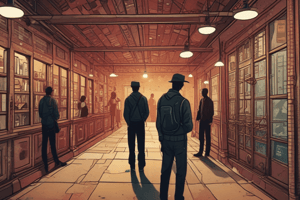Podcast
Questions and Answers
What is the main difference between crime and deviance?
What is the main difference between crime and deviance?
- Crime is a violation of social norms, while deviance is a violation of the law
- Crime is a violation of the law, while deviance is a violation of social norms (correct)
- Crime is a social construct, while deviance is a natural behavior
- Crime is a natural behavior, while deviance is a social construct
What is an example of how crime is socially constructed?
What is an example of how crime is socially constructed?
- Laws and attitudes towards drugs have changed over time (correct)
- The punishment for murder is the same in every country
- Stealing is a crime in every culture
- The death penalty is used in every country
What is the main goal of primary prevention strategies?
What is the main goal of primary prevention strategies?
- To intervene in situations that may lead to crime
- To punish criminals after a crime has been committed
- To prevent crime from occurring in the first place (correct)
- To deal with the consequences of crime
What is an example of a situational crime prevention strategy?
What is an example of a situational crime prevention strategy?
What influences the definition and punishment of crime?
What influences the definition and punishment of crime?
What is the main goal of tertiary prevention strategies?
What is the main goal of tertiary prevention strategies?
What is the primary focus of the criminal justice system?
What is the primary focus of the criminal justice system?
What is the main goal of retribution as a purpose of punishment?
What is the main goal of retribution as a purpose of punishment?
Which theory suggests that crime is a result of blocked opportunities?
Which theory suggests that crime is a result of blocked opportunities?
What is the primary goal of restorative justice?
What is the primary goal of restorative justice?
Which component of the criminal justice system is responsible for supervision and rehabilitation?
Which component of the criminal justice system is responsible for supervision and rehabilitation?
What is the main criticism of the criminal justice system regarding racial and social biases?
What is the main criticism of the criminal justice system regarding racial and social biases?
Flashcards are hidden until you start studying
Study Notes
Crime and Deviance
- Crime: behavior that breaks the law and is punishable by the state
- Deviance: behavior that goes against social norms and values
- Difference between crime and deviance: crime is a violation of the law, while deviance is a violation of social norms
- Examples of deviance: tattoos, piercings, alternative lifestyles
Social Construction of Crime
- Crime is a social construct: it is defined and shaped by society and its values
- Crime is relative: what is considered a crime in one society may not be in another
- Crime is influenced by:
- Cultural norms and values
- Political and economic factors
- Social and economic inequalities
- Media representation
- Examples of how crime is socially constructed: changing laws and attitudes towards drugs, homosexuality, and abortion
Crime Prevention Strategies
- Primary prevention: preventing crime from occurring in the first place
- Secondary prevention: intervening in situations that may lead to crime
- Tertiary prevention: dealing with the consequences of crime
- Examples of crime prevention strategies:
- Environmental design (e.g. CCTV, street lighting)
- Community-based initiatives (e.g. neighborhood watch)
- Situational crime prevention (e.g. target hardening)
- Restorative justice
Criminal Justice System
- The process of dealing with crime from arrest to sentencing
- Key components:
- Police: investigation and arrest
- Courts: trial and conviction
- Prisons: punishment and rehabilitation
- Probation: supervision and rehabilitation
- Criticisms of the criminal justice system:
- Racial and social biases
- Inefficiency and bureaucracy
- Lack of rehabilitation and reintegration
Punishment and Sentencing
- Purposes of punishment:
- Retribution: punishment as revenge
- Deterrence: punishment as a deterrent to others
- Rehabilitation: punishment as a means to reform
- Incapacitation: punishment as a means to protect society
- Types of sentencing:
- Custodial sentences: imprisonment
- Non-custodial sentences: fines, community service, probation
- Restorative justice: victim-offender mediation
Individual Theories
- Classical theory: crime is a result of individual choice and rational decision-making
- Positivist theory: crime is a result of individual factors such as biology, psychology, and sociology
- Examples of individual theories:
- Cesare Lombroso's biological theory: crime is a result of physical characteristics
- Sigmund Freud's psychological theory: crime is a result of unconscious motivations
Sociological Theories
- Sociological theory: crime is a result of social factors such as poverty, inequality, and socialization
- Examples of sociological theories:
- Robert Merton's strain theory: crime is a result of blocked opportunities
- Albert Cohen's subcultural theory: crime is a result of deviant subcultures
- Emile Durkheim's anomie theory: crime is a result of social norms and values
Biological Theories
- Biological theory: crime is a result of biological factors such as genetics, brain chemistry, and evolution
- Examples of biological theories:
- Genetic theory: crime is a result of genetic predisposition
- Neurological theory: crime is a result of brain chemistry and function
- Evolutionary theory: crime is a result of adaptive behavior
Studying That Suits You
Use AI to generate personalized quizzes and flashcards to suit your learning preferences.




